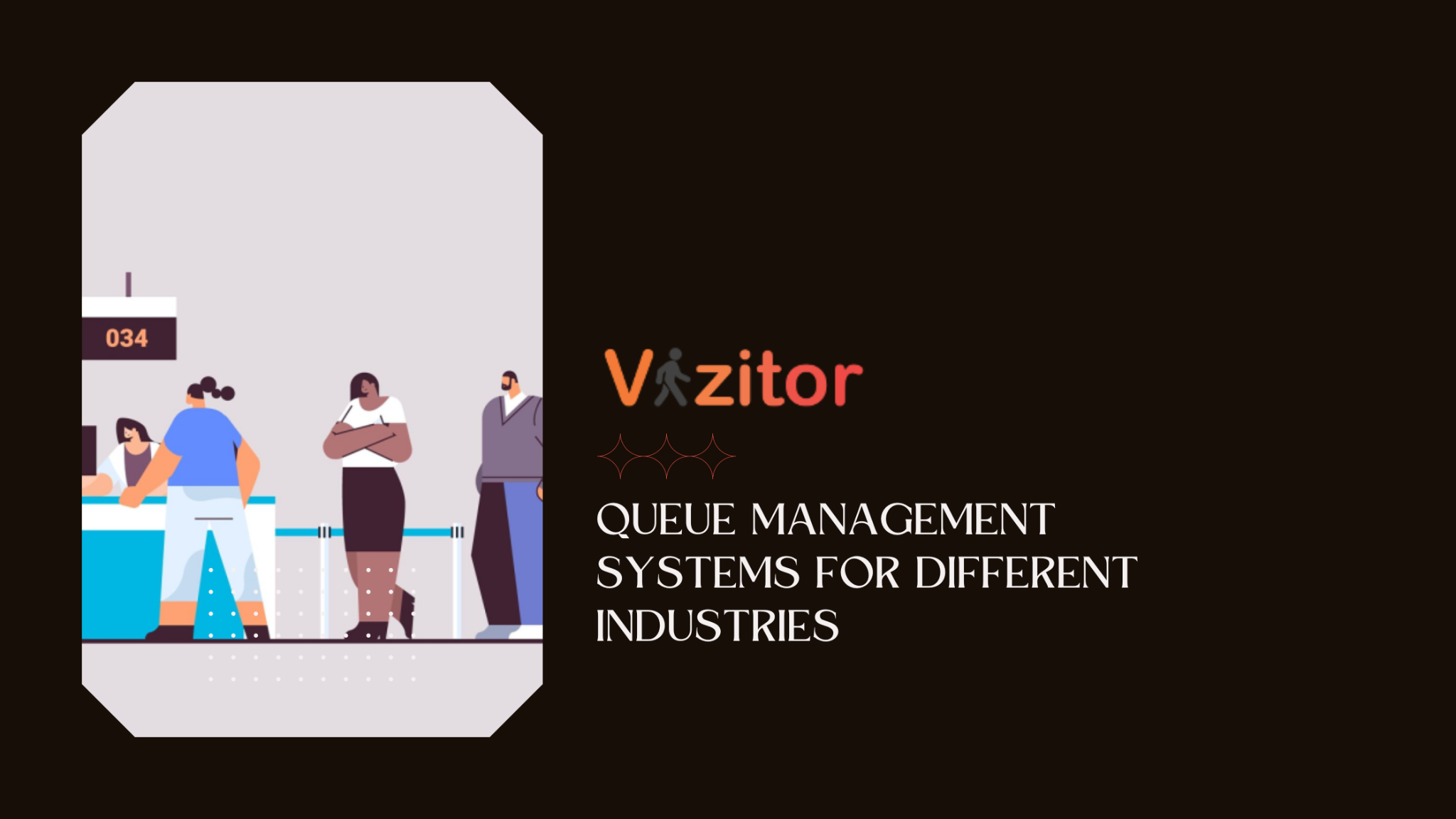Table of Content
Try Vizitor for Free!

Sat, May 11, 2024
Read in 15 minutes
Introduction
Queue management systems (QMS) are essential tools for enhancing customer experiences and operational efficiency across various industries. These systems help manage customer flow, reduce wait times, and improve service quality. The best industry-specific queue management systems are tailored to meet the unique needs of each sector, ensuring optimal performance and customer satisfaction.
Did you know? Businesses can reduce customer wait times by up to 30% with an effective queue management system.
Different industries require queue management systems for several reasons:
-
Healthcare: Hospitals and clinics use QMS to manage patient appointments and walk-ins, ensuring timely consultations and reducing congestion in waiting areas.
-
Retail: Stores implement QMS to streamline checkout processes, enhance the shopping experience, and prevent long lines that can deter customers.
-
Banking: Banks utilize QMS to organize customer service requests, leading to faster transactions and improved customer satisfaction.
-
Government Services: Government offices adopt QMS to handle large volumes of applicants efficiently, reducing wait times and improving service delivery.
-
Hospitality: Hotels and restaurants use QMS to manage reservations and walk-ins, ensuring smooth operations and enhanced guest experiences.
By implementing an industry-specific queue management system, businesses can significantly improve customer satisfaction and operational efficiency, ultimately leading to increased loyalty and profitability.
Why Choosing the Right Queue Management System is Key to Business Success
In today’s competitive business world, providing excellent customer service is crucial for success. Customers expect personalized experiences and minimal wait times. This is where Queue Management Systems benefits are essential.
1. Enhances Customer Experience and Satisfaction: The right QMS reduces wait times, offers personalized service, and increases convenience, greatly improving customer satisfaction.
2. Streamlines Operations and Increases Staff Productivity: A QMS automates processes, reduces manual work, and provides real-time data, boosting staff productivity and efficiency.
3. Provides Valuable Insights: QMS collects data on customer behavior, wait times, and service times, offering valuable insights into business operations and customer preferences.
4. Reduces Costs: By streamlining operations and reducing manual tasks, a QMS can lower costs related to staffing, wait times, and customer retention.
5. Improves Safety and Security: QMS can control access to spaces, minimize crowding, and help enforce safety protocols, ensuring a safe environment for customers and staff.
6. Ensures Flexibility and Customization: The right QMS can be tailored to meet specific business needs, aligning with business goals and requirements.
How to Choose the Right Queue Management System for Your Industry
Choosing the right Queue Management System (QMS) for your industry can significantly impact your business’s efficiency and customer satisfaction. Here are some key steps to help you make the right choice:
1. Understand Your Business Needs
Start by identifying your business goals and requirements. Consider the nature of your industry and the specific challenges you face. For instance, a hospital will have different needs compared to a retail store. Outline what you aim to achieve with a QMS, such as reducing wait times, improving customer experience, or streamlining operations.
2. Evaluate Features and Functionality
Look for a QMS that offers the features you need. Common features include:
1. Virtual Queuing: Allows customers to join a queue remotely via their smartphon.
2. Appointment Scheduling: Lets customers book appointments in advanc.
3. Real-time Updates: Provides staff and customers with real-time information on queue statu.
4. Data Analytics: Offers insights into customer behavior, wait times, and service efficienc.
5. Customization: Ability to tailor the system to your specific needs.
Ensure the QMS you choose has the flexibility to meet your business requirements.
3. Consider Scalability
Choose a QMS that can grow with your business. As your business expands, your QMS should be able to handle increased customer volume without compromising performance. Scalability is crucial for ensuring long-term effectiveness and return on investment.
4. Integration with Existing Systems
Ensure the QMS can seamlessly integrate with your current systems, such as CRM, POS, or any other management software you use. Integration helps in creating a cohesive workflow and avoids disruptions in your operations.
5. User-Friendliness
The QMS should be easy to use for both your staff and customers. A complicated system can lead to frustration and reduced efficiency. Look for systems with intuitive interfaces and clear instructions.
6. Vendor Support and Reputation
Research potential vendors to ensure they have a good reputation and provide excellent customer support. Read reviews, ask for references, and consider their experience in your industry. Reliable support is essential for troubleshooting and maintaining the system.
7. Cost and ROI
Evaluate the cost of the QMS, including setup, maintenance, and any additional fees. Compare these costs with the potential benefits and savings the system can bring. A higher upfront cost may be justified if the system significantly improves efficiency and customer satisfaction, leading to a better return on investment (ROI).
8. Safety and Security
Consider how the QMS can enhance safety and security. Features like crowd control, access management, and compliance with safety protocols are particularly important in sectors like healthcare and government services.
Queue Management Systems for Different Industries
Queue Management tools are important as they help businesses manage customer flow and improve service efficiency. These systems are tailored to meet the unique needs of various industries, ensuring a better customer experience and streamlined operations. Here’s a look at how QMS can benefit different sectors:
1. Healthcare
Challenges: Healthcare facilities, such as hospitals and clinics, often face long patient wait times and overcrowded waiting rooms. Managing appointments, walk-ins, and emergency cases efficiently is crucial for both patient satisfaction and operational effectiveness.
Benefits of QMS:
1. Appointment Scheduling: Patients can book appointments online, reducing the need for phone calls and walk-in queue
2. Virtual Queueing: Patients receive updates on their wait times via their smartphones, allowing them to wait comfortably at home or in a designated are
3. Efficient Resource Allocation: Staff can manage patient flow better, ensuring that resources are allocated where they are most neede
4. Data Collection: The system gathers data on patient wait times and service efficiency, helping to identify areas for improvement.
Example: Queue Management Systems for hospitals to manage various departments such as radiology, cardiology, and general consultations, ensuring that each department operates smoothly and efficiently.
2. Retail
Challenges: Retail stores, especially during peak shopping times, often experience long lines at checkout counters, which can lead to frustrated customers and lost sales.
Benefits of QMS:
1. Streamlined Checkout: Self-service kiosks and mobile payment options reduce wait times and speed up the checkout process.
2. Customer Notifications: Shoppers are alerted about their queue status via their phones, allowing them to browse other sections of the store or continue shopping.
3. Data Insights: Retailers gain insights into customer shopping patterns, peak times, and service speed, helping them optimize staffing and store layout.
Example: A supermarket might use a Queue Management System for Retail to manage checkout lines and self-service stations, ensuring that customers have a smooth and quick shopping experience.
3. Banking
Challenges: Banks often deal with various customer service needs, from account inquiries to loan applications. Managing these services efficiently is crucial to avoid long wait times and customer dissatisfaction.
Benefits of QMS:
1. Appointment Scheduling: Customers can book appointments for specific services, reducing wait times for in-branch visit
2. Queue Numbering: A digital display system manages queue numbers, informing customers about their turn and the estimated wait tim
3. Service Tracking: The system tracks the time each customer spends on different services, helping banks improve their processes and staff training.
Example: A bank branch might use a QMS to manage customer flows at different service desks, such as tellers, loan officers, and financial advisors, ensuring a smooth and efficient service experience.
4. Government Services
Challenges: Government offices, such as DMV or social services, often handle high volumes of visitors needing various services. Managing these queues effectively is crucial to provide timely and efficient service.
Benefits of QMS:
1. Ticket-Based Systems: Visitors take a ticket upon arrival and are called in order, reducing confusion and wait time
2. Real-Time Updates: Displays and mobile alerts keep visitors informed about their queue status and expected wait time
3. Appointment Management: The system allows for appointments to be scheduled in advance, reducing the volume of walk-in visitors and smoothing out peak times.
Example: A DMV office might use a QMS to handle vehicle registrations, driver’s license renewals, and other services, ensuring that each service area operates efficiently and reducing overall wait times.
5. Hospitality
Challenges: Hotels and restaurants need to manage reservations and walk-ins effectively to provide a pleasant guest experience. Long wait times can negatively impact guest satisfaction and business reputation.
Benefits of QMS:
1. Reservation Management: Customers can book rooms or tables in advance, reducing wait times and ensuring availabilit
2. Queue Notifications: Guests receive updates on their reservation status or table availability via SMS or app notification
3. Flexible Seating: The system helps manage seating arrangements and optimize space usage, ensuring a smooth dining or lodging experience.
Example: A restaurant might use a QMS to manage reservations and waitlists, ensuring that guests are seated promptly and efficiently, while also allowing for real-time updates on wait times.
6. Education
Challenges: Educational institutions, such as universities and schools, often manage large numbers of students for various services, including admissions, counseling, and administrative support.
Benefits of QMS:
1. Appointment Scheduling: Students can book appointments with counselors or administrative offices, reducing wait times and improving service efficienc
2. Digital Queuing: Students receive digital tickets or notifications, allowing them to manage their time while waiting for their tur
3. Service Tracking: The system tracks the time spent on various services, helping institutions identify bottlenecks and improve processes.
Example: A university might use a QMS to handle student appointments with academic advisors and administrative offices, ensuring that each student receives timely and efficient support.
7. Transportation
Challenges: Airports, train stations, and bus terminals often deal with high passenger volumes and need to manage queues for check-ins, security, and boarding efficiently.
Benefits of QMS:
1. Check-In Management: Automated check-in kiosks and online check-in options reduce long lines and improve the boarding proce
2. Real-Time Updates: Passengers receive updates on flight or departure status, reducing uncertainty and stre
3. Queue Optimization: The system helps manage and optimize queues at various checkpoints, improving overall passenger flow.
Example: An airport might use a QMS to manage check-in counters, security lines, and boarding gates, ensuring that passengers move through each stage of their journey efficiently.
Top Queue Management Systems
There are many Queue Management Systems (QMS) available, each offering different features to meet the needs of various businesses. Here are some of the top QMS options:
1. Qminder
Qminder is a cloud-based QMS that lets customers join the queue remotely. They can see real-time updates about their wait time and check their place in the queue from their devices.
2. Vizitor
Vizitor is a cloud-based Visitor Management System with QMS features. It allows customers to book appointments, check in, join the queue remotely, and get notifications when it’s their turn.
3. QLess
QLess is a QMS that enables customers to join the queue remotely and receive real-time updates via SMS or email. It also provides staff with real-time data and reports on wait times and service levels.
4. Skiplino
Skiplino is a cloud-based QMS that allows customers to join the queue remotely, track their place in the queue, and get notifications when it’s their turn. It also offers real-time analytics and reporting on wait times and service levels.
5. Wavetec
Wavetec provides a QMS with features like remote queuing, digital signage, and analytics. Customers can join the queue remotely, and staff can manage it through a web-based dashboard.
These systems help businesses manage customer flow efficiently, reduce wait times, and improve overall service quality.
How Vizitor Helps You Get the Right Queue Management System
Choosing the right Queue Management System (QMS) is essential for optimizing your business operations and enhancing customer satisfaction. Vizitor stands out as a powerful tool that can help you achieve these goals effectively. Here’s how Vizitor can assist you in getting the right QMS for your needs:
1. Comprehensive Features
Vizitor offers a robust set of features designed to address various aspects of queue management. From appointment scheduling to remote check-ins and real-time notifications, Vizitor’s features are tailored to meet the diverse needs of different industries. Customers can book appointments in advance, join queues remotely, and receive timely updates about their place in line. This flexibility ensures that businesses can manage customer flow efficiently and provide a smoother experience for their clients.
2. User-Friendly Interface
One of the key benefits of Vizitor is its user-friendly interface. Both customers and staff can navigate the system easily without extensive training. For customers, this means they can quickly book appointments or check in without frustration. For staff, the intuitive dashboard simplifies queue management, allowing them to focus on providing quality service rather than dealing with complex software.
3. Real-Time Analytics
Vizitor provides real-time analytics and reporting that offer valuable insights into your queue management processes. By analyzing data on customer wait times, peak periods, and service efficiency, you can make informed decisions to improve your operations. This data helps identify bottlenecks and areas where adjustments are needed, allowing you to enhance overall efficiency and customer satisfaction.
4. Customization and Flexibility
Every business has unique needs, and Vizitor understands this. The system is highly customizable, allowing you to tailor it to your specific requirements. Whether you need to manage appointments, walk-ins, or a combination of both, Vizitor can be adjusted to fit your business model. This flexibility ensures that the QMS aligns with your goals and operational processes, providing a solution that works best for you.
5. Integration with Existing Systems
Vizitor integrates seamlessly with other systems you may already be using, such as CRM or POS systems. This integration helps create a cohesive workflow, reducing the need for manual data entry and improving overall efficiency. By connecting Vizitor with your existing systems, you can streamline operations and ensure that customer information is accurately and efficiently managed.
6. Enhanced Customer Experience
Customer experience is at the heart of Vizitor’s design. By offering features like remote queue joining and real-time updates, Vizitor ensures that customers are well-informed and less likely to experience long wait times. This improves their overall experience and increases the likelihood of repeat business. Happy customers are more likely to recommend your services to others, contributing to positive word-of-mouth and business growth.
7. Scalability
As your business grows, your queue management needs may change. Vizitor’s scalable solutions mean that the system can grow with you. Whether you’re expanding to new locations or handling increased customer volumes, Vizitor can adapt to meet your evolving needs. This scalability ensures that you’re always equipped with a QMS that supports your business’s growth and success.
8. Reliable Support
Vizitor provides excellent customer support to ensure that you get the most out of your QMS. Whether you need assistance with setup, training, or troubleshooting, Vizitor’s support team is available to help. Reliable support means that you can address any issues quickly and keep your queue management processes running smoothly.
Frequently Asked Questions
How does Vizitor work?
Vizitor allows customers to join the queue remotely through their smartphones or online. They receive real-time updates on their wait time and can check their place in the queue. For businesses, Vizitor provides a user-friendly dashboard to manage queues, appointments, and customer data.
What industries can benefit from Vizitor?
Vizitor is versatile and can be used across various industries, including healthcare, retail, banking, government services, hospitality, education, and transportation. Its features are customizable to meet the specific needs of different sectors.
How can Vizitor improve customer experience?
Vizitor improves customer experience by reducing wait times and providing real-time updates. Customers can join the queue remotely and receive notifications about their turn, which minimizes frustration and enhances their overall experience.
What is a Queue Management System (QMS)?
A Queue Management System (QMS) is a tool designed to manage customer flow and reduce wait times. It helps businesses organize queues, provide real-time updates, and improve the overall customer experience. QMS can be customized to fit the needs of various industries, including healthcare, retail, banking, and more.
How can a QMS benefit the healthcare industry?
In healthcare, a QMS helps manage patient appointments, reduce wait times, and streamline the check-in process. It allows patients to book appointments online, receive updates on their wait status, and helps staff allocate resources more efficiently, improving overall patient satisfaction.
What advantages does a QMS offer to retail businesses?
For retail businesses, a QMS can streamline checkout processes, manage in-store queues, and reduce wait times. Features like self-service kiosks and mobile notifications help enhance the shopping experience by allowing customers to join the queue remotely and receive updates on their status.
How does a QMS improve service in banks?
In banks, a QMS helps manage customer flow at various service desks, such as tellers and loan officers. It allows customers to join queues remotely, schedule appointments, and receive real-time updates. This leads to faster service, reduced wait times, and improved customer satisfaction.
What role does a QMS play in government services?
A QMS in government services helps manage high volumes of visitors for services like license renewals or permits. It organizes queues, provides ticket-based systems, and allows for appointment scheduling, which reduces congestion and wait times, improving service efficiency.
How does a QMS benefit the hospitality industry?
In the hospitality industry, such as hotels and restaurants, a QMS manages reservations, walk-ins, and table assignments. It allows guests to book or check in remotely and provides real-time updates on their status, ensuring a smooth and efficient service experience.
Can a QMS be used in educational institutions?
Yes, educational institutions use QMS to manage student appointments with counselors, administrative services, and other support functions. It helps schedule appointments, track wait times, and improve the efficiency of service delivery within the institution.
How does a QMS assist in transportation services?
In transportation, such as airports or train stations, a QMS manages queues for check-ins, security checks, and boarding. It allows passengers to check in remotely, receive updates about their flight or departure status, and helps manage passenger flow to enhance the travel experience.










